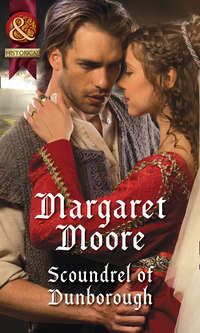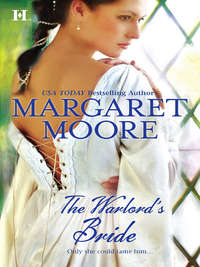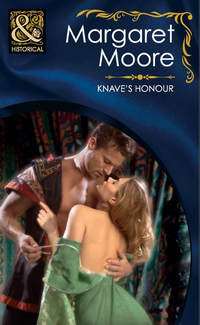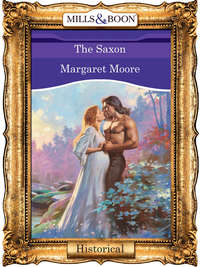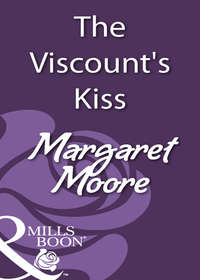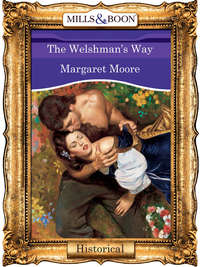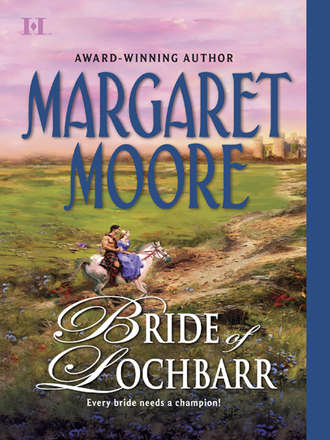
Полная версия
Bride of Lochbarr
The sun shone brightly, and a warm breeze brought the scent of damp earth to their nostrils, along with wet sand, stone and mortar from the growing walls. All around them they could hear the workmen calling to one another, or talking among themselves in the rough tongue of the Sassunach. The mason, a slender fellow who looked as though a strong breeze would blow him away, bustled to and fro, ordering and chiding and complaining as he created this foreign monstrosity on the sacred soil of Alba.
Lachlann nodded at their father, who marched toward his horse without so much as a glance at his sons. “Father’s in a right foul mood now.”
“So he should be, but not with me,” Adair answered as he swung into the saddle. “With those scheming Norman bastards and Hamish Mac Glogan. It’s not enough the Normans are stealing our land with the king’s help. Now they’re doing it by marriage.”
Their father, mounted on his horse, raised his hand to signal his men to head toward the gate. He was at the front of the band, followed by Roban and Cormag and the others, while Adair and Lachlann brought up the rear.
Adair could feel the animosity in the stares of the Norman’s soldiers, and he glared right back at the thieving foreigners. Let one of them draw his weapon. He’d be feeling the tip of Adair’s dirk at his throat before he took another breath.
Lachlann gave Adair a warning look. “These aren’t the men who killed Cellach, you know.”
“I know.”
“And she died years ago, Adair.”
It was easy for Lachlann to put Cellach from his mind. He hadn’t been the one who’d found her ravished, broken body.
Lachlann sighed, and changed the subject. “Sir Nicholas’s sister is certainly lovely. It’s too bad she didn’t come back to the hall, but it was obvious her brother was angry with her for inviting us to stay.”
He’d been livid, if Adair was any judge. That’s why he’d been worried the Norman had hurt her. He wouldn’t put it past the man to beat his sister. Yet she’d denied it, and he didn’t think she was lying. There’d been no hidden hint of falsehood in her shining eyes. Not then, anyway.
“I think she liked you, Adair,” Lachlann noted with a smile. “No surprises there, I suppose.”
“She didn’t like me.” Except, perhaps, to kiss—a notion that rankled.
“Aye, she did. I saw all the usual signs when she looked at you.”
“I wouldn’t trust any ‘signs’ she gives, any more than I would her brother.”
“Then it won’t matter to you that she’s watching us right now.”
Adair stiffened. “The devil she is.”
“Aye, she is, from her window in the apartments beside the hall. She’s peeking out as shy as a novice stealing glances at a handsome priest.”
Adair glanced up and over his shoulder. Lady Marianne was there, standing at the window and watching them. He couldn’t see her face well enough to make out her expression.
She was probably delighted he was leaving and taking their secret with him. The duplicitous, deceitful, beautiful, passionate…
Then Sir Nicholas came to stand behind her, looming tall and stern in the shadows behind her, like some sort of judge. Or executioner.
He could well believe that Lady Marianne had been trying to get away from her brother, no matter what she said.
Perhaps she’d been fleeing because she didn’t want to marry Hamish Mac Glogan—until he’d stopped her, putting her neck right back in her brother’s noose, as if he were Sir Nicholas’s henchman.
“Adair!” his father called, gesturing for his son to ride to the head of their party.
He hesitated.
“Adair!”
“What’s the matter?” Lachlann demanded in an urgent whisper. “Have you lost your hearing, or do you want to linger longer here among the Normans?”
“Nay, I don’t want to linger here,” Adair muttered as he punched Neas’s side with his heels and went to join his father.
RIDING BESIDE ADAIR at the head of their party, Seamus drew in a deep breath. They were in a pine wood between Lochbarr, their village on a long lake, and Dunkeathe, recently given over to the Norman. Several small streams splashed their way down the rocky, needle-covered slope to the loch.
Lachlann had moved forward, so that now he was behind Adair and his father, and beside Cormag. The rest of the men came after, including Roban, who was robustly singing a bawdy song at the top of his lungs, scaring the birds and sending the wildlife scattering.
The chieftain raised his voice to be heard over the sound of Roban’s deep voice and the jingling of the horses’ accouterments. “This is better than being in that Norman’s castle. A man can breathe out here.”
“Aye,” Adair agreed. “I felt like my belt was too tight the whole time I was in that place.”
“Not too tight to keep you from wandering in the night,” his father pointedly remarked. “Where were you?”
“I went to the mason’s hut. I wanted to see the plans for the castle.”
His father abruptly reined in his horse, causing them all to halt. “You did what?”
Adair met his father’s shocked gaze steadily. “I wanted to know more about the fortifications he’s planning on building. That castle makes Lochbarr look like a farmer’s yard.”
“You could have got us all killed!” Cormag cried, his anxious horse dancing beneath him.
Adair twisted in his saddle and studied his cousin, catching sight of an equally thunderstruck Lachlann. “I wasn’t caught.”
Not by the guards, anyway.
“But you might have been,” Lachlann said, aghast.
“I had my excuse ready.”
“Which was?” his father demanded.
Adair put on a pained expression. “That I was having trouble with my bowels and looking to relieve myself.”
His father, Lachlann and some of the other men smiled. Cormag, and those in the band who were his cousin’s friends, did not.
“You were lucky,” Lachlann said.
“Not that lucky,” Adair replied. “I couldn’t find the plans. They must have been locked away in the box I saw in the mason’s hut.”
Beneath the table Lady Marianne had leaned against, watching him warily, as if she was afraid he might bite. He couldn’t bear the thought of any woman being frightened of him—another reason he’d stayed, he supposed.
“What a surprise they weren’t left lying about for anybody to see,” Cormag said sarcastically. “Even your father’s tact couldn’t have saved you if you’d been found looking over the plans. We might all have been hung for spying. But you didn’t think of that, did you?”
In truth, he hadn’t. He’d been too keen to find out all he could about the castle. “Don’t fash yourself, Cormag.”
The chieftain nudged his horse into a walk, as did the others. “Whether you were caught or no,” he said to his son, “I have to agree that wasn’a a wise thing to do, especially when you might have guessed that the plans would be kept away from prying eyes.”
“Aye, ’twas a fool’s errand,” Cormag loudly complained. “We don’t need to see any plans to realize the Norman’s fortifying Dunkeathe in a way that’ll make it hard to beat him.”
“With one wall, or two?” Adair asked, defending his fool’s errand. “I’ve heard that some Norman castles have two curtain walls, and a few even three. They have towered gatehouses and bossed gates, secret passages for escape, dungeons and even a murder hole.”
“A murder hole? Losh, what’s that?” Lachlann asked.
“’Tis a hole in the roof between the portcullis at the entrance to the gatehouse and the gate at the other end. They can drop rocks through it on invaders, or boiling oil.”
“God help us,” Lachlann murmured, and a few of the men crossed themselves, or made the sign against the devil.
“Aye. That’s why I wanted to see what Sir Nicholas was up to. He strikes me as the sort to have a murder hole. And lots of dark, damp cells.”
Perhaps he’d lock his sister away in one if he somehow found out she’d met a Scot in the mason’s hut, or was trying to escape his castle.
Adair shoved that thought away. “Father, I’m thinking we should rebuild our own defenses.”
“Aye, my son, so am I.”
“Especially if the Norman’s making an alliance with Mac Glogan.”
“That’s a bad business, right enough,” his father agreed.
“Can you not put a stop to it? You could go to the king. You’re a thane and a chieftain. Alexander ought to listen to you.”
“Sir Nicholas has Alexander’s favor, so any objections will have to be made carefully,” his father replied.
“Then Adair’d better stay at home if you decide to go,” Cormag said. “Or he’ll likely lose his temper with the king.”
“Shut it, Cormag,” Adair warned.
“If you really want to prevent the marriage, why not seduce the woman, Adair?” Cormag suggested, his voice full of scornful mockery. “Women are helpless to resist your pretty face and braw body, are they not?” He grinned and raised his voice, imitating a woman. “Oh, Adair, kiss me! Hold me! Raise my skirts and—”
Adair was off his horse and dragging Cormag from his before any of the other men had time to blink.
“Father!” Lachlann cried as the two Scots wrestled in the mud of the narrow path, all bare legs and plaids and curses. “Stop them before they kill each other.”
“They’ll not do that,” Seamus said as he continued to ride for home. “Let them fight awhile. Then maybe we’ll have some peace in our hall tonight. Those Normans weary me something fierce, and I need to think.”
CHAPTER FOUR
FIVE DAYS LATER, Neas fairly danced with impatience to be free of the confines of his stall.
Motes of dust and bits of chaff from the hay swirled in the air and about the beams of the stables. The scent of thatch mingled with dung and the leather of bridles, saddles and harnesses. The other horses munched contentedly, or shifted and refooted, some more lively than others because one of their number was going to be leaving as soon as its master could saddle it.
The stable door opened, throwing a shaft of sunlight into the dimmer building.
“Adair!” Lachlann exclaimed as he paused on the threshold. “I wasn’t expecting to find you here. I thought you’d be on patrol with Roban and the others.”
Partly hidden by Neas, Adair silently cursed. He’d hoped to ride out without having to explain where he was going, or why. “I was, then decided Neas needs more of a run.” He threw a fleece over his horse’s back. “It’s been too long since he had a good gallop.”
“Aye. I can’t remember a wetter summer.” Lachlann strolled closer, studying his brother’s face as Adair heaved the saddle onto Neas. “You’re healing, I see.”
“Thanks to that awful stinking stuff Beitiris makes. Smells worse than a bog, but it works.” Adair bent down to buckle the girth. “How’s Cormag?”
“His eye’s a charming motley of purple and green and yellow, but he can open it now,” Lachlann answered. “He’s limping yet, though.”
Lachlann leaned back against the upright beam at the end of the stall. “Cormag’s still some furious. Do you think it’s wise to fight with him so much and so openly?”
“What are you getting at?”
“He’s never liked you, Adair.”
“Nor I, him. What of that?”
Lachlann patted Neas’s muzzle. The beast shivered and pranced, so Lachlann withdrew his hand. “It’s not good to have enemies within the clan.”
Lachlann worried about Cormag too much. “He’s my cousin and clansman. He’ll stand with me in a battle.”
“I hope you’re right.”
“If he doesn’t, you and I both know the fate of a man who’ll betray his clan.”
“So you’re not worried about Cormag at all?” Lachlann asked, his gaze searching Adair’s face as if he doubted Adair could really have so little concern for what Cormag thought of him.
“Cormag’s our cousin. That’s what’ll matter when it comes to a battle.”
“Then something else is troubling you.”
“That damned Norman and his castle,” Adair readily admitted. “He shouldn’t be here, and that castle’ll be hard to capture if the king changes his mind and wants to rid our land of those foreigners. And now he’s allying himself with Mac Glogan, who’d sell his own mother for the right price.”
“Aye, ’tis troubling. No wonder you’ve been so quiet lately.”
Adair forced a laugh as he started to lead Neas around Lachlann. “You’re the one always saying I ought to think more.”
And he had been thinking, ever since he’d returned from Dunkeathe, about the marriage and the lady and the escape he’d prevented.
“So, where will you be riding?” Lachlann asked as he followed Adair and Neas into the yard.
“The south meadow,” Adair answered, not completely lying, for he would indeed be heading south on this fine day. The sky was blue enough to make you think you’d never seen blue like it before. Not a cloud was overhead, nor was there even a hint of mist on the hills around the loch.
“Care for some company on your ride?”
“Not today, Lachlann. I’m not in a mood to talk.”
Lachlann put his hand on Adair’s arm to detain him. “It’s too dangerous,” he said in a low and confidential whisper.
“Since when has riding been dangerous for me?” Adair demanded with a raised brow.
“It’s not the riding,” Lachlann answered, still in that same low, cautious tone. “It’s the woman. You can fool Father and the others, but you can’t fool me, Adair. You want Lady Marianne—I could see it in your eyes the moment you turned around and saw her.”
Adair grabbed his brother’s arm and pulled him back into the stable, taking Neas with them. Once they were inside and the door closed behind Neas, Adair tossed his horse’s reins over a stall wall and faced Lachlann. “I’m not some lascivious lout.”
Lachlann didn’t back down. “I saw the look on your face when we rode away from Beauxville—”
“Dunkeathe.”
His brother shrugged. “Their fortress.”
“It’s their fortress and their alliance with Mac Glogan that’s got me worried,” Adair declared. “I’m worried the Normans are marrying into clans because they’re trying to take Scotland over from within, like a plague infecting a village.”
“I don’t believe that’s all there is to this.”
Before Adair could refute his charge, Lachlann’s expression softened. “It’s not just lust you feel for her, Adair. I know that. Ever since Cellach was killed you’ve had a weakness for a woman in trouble and Lady Marianne’s betrothed to Hamish Mac Glogan. No woman could be happy married to him. But it’s not your place to interfere.”
“It’s not my place to pretend it’s not important, either,” Adair retorted, leaving Cellach out of it. “Father hasn’t said another word about going to the king to stop the wedding—and it has to be stopped. With the Norman to the south, Mac Glogan to the west and the sea to the east, we’re in a trap.”
“The clans to the north are our friends,” Lachlann said, his tone reasonable and calm. “And Father’s right to be cautious. He has to be sure preventing the marriage is the right thing to do, and plan the best way to go about it if it is.”
“Of course it’s the right thing to do!” Adair strode a few paces away, then back again. “What if Father spends so much time thinking, she’s married before he stirs? Then there’ll be nothing anybody can do.”
“Perhaps Father has his reasons for not interfering. Have you asked him?”
Adair didn’t answer.
Lachlann sighed. “I thought not. Leave it, Adair, and leave her. You’ll only make things worse if you go back to Beaux—Dunkeathe.”
Adair’s impatience was getting difficult to control. “Did I say I was going to Dunkeathe?”
“If you’re not, there’s no reason I shouldn’t go riding with you. I could use the practice. You’re always telling me I sit my horse like a bag of stones.”
Adair bit back another retort, because he recognized the look in Lachlann’s eyes; the lad wasn’t going to give up. So he had two choices: lie, or be honest.
“All right, Lachlann, you’ve caught me,” he said, spreading his hands. “I want to ride to Dunkeathe—but just to get a look at Lady Marianne. If I can find proof she’s being forced to marry, that’ll surely convince Father to go to the king. Father hates to see a woman being used against her will as much as I.”
Lachlann regarded Adair doubtfully. “How do you intend to get into the castle? You can’t ride up and announce your intentions to Sir Nicholas.”
“I’ll sneak in.”
“Let’s say you succeed in getting into the castle. How will you know what’s passing between the lady and her brother, or if she objects?”
“I’ll find out somehow.”
“Hamish Mac Glogan is rich and has influence with Alexander. Maybe she thinks those things outweigh Mac Glogan’s faults.”
“She’s not a gomeral, and only a gomeral would think anything outweighs that old villain’s faults.” Adair’s voice hardened, like his resolve the moment he’d decided what he had to do. “You aren’t going to try to stop me, are you, Lachlann?”
His brother shook his head. “Much as I’d like to, you’d only go another time. And as you say, if she’s being forced, that’s a good reason for our father to go to the king and try to stop the marriage. So perhaps there’s no harm in a wee visit to Dunkeathe—but you have to let me go, too. You need somebody with you who can keep a cool head.”
Adair realized he had little choice but to agree, or he would have to waste even more time arguing, and he’d wasted too much already. “Hurry up, then, and saddle your horse.”
Lachlann didn’t move. “Are you planning to go dressed like that? You’ll be a tad kenspeckle in your feileadh. Should you not make an effort at disguise?”
“Losh, you’re right,” Adair muttered, looking down at his clothes.
“I’ll fetch some other garments while you saddle my horse,” Lachlann said, turning to go.
Adair beat him to the door. He didn’t want to risk Lachlann revealing their intentions, if only by accident. “I’ll fetch the clothes.”
Lachlann raised a skeptical brow. “And what will you say you want them for?”
“What excuse will you be giving?” Adair countered.
“I’ll think of something, and I’m a better liar.”
That was true. Lachlann could lie as cool as you please. “Go, then, and be quick about it. I’ll have your horse ready by the time you get back. If you meet anyone, tell them we’re going to the south meadow.”
“Aye, I remember,” Lachlann said. His hand on the latch, he turned back and flashed a grin at his elder brother. “I’m no gomeral, either, Adair.”
“THERE’S OUR CHANCE,” Adair whispered as he peered out of an alley between a tavern and the village smithy outside the castle walls of Dunkeathe.
Coming from the nearby wood, a group of laborers walked past. They were carrying bundles of long poles, probably intended for scaffolding in the castle.
“We’ll get ourselves a bundle and walk in, easy as you please.”
Dressed like Adair in tunic, breeches and short cloak, with a hood pulled up over his head and his dirk hidden in his boot, Lachlann didn’t look convinced. “Will the guards not realize we’re—?”
“They’re not even looking at the poor sods. Keep your head bowed and look humble and they’ll take no notice, the arrogant oafs. Come on.”
Planning to circle around to the wood where they’d left their horses, Adair started back toward the other end of the alley. “Hurry up, Lachlann!”
Lachlann quickened his pace, and soon they reached the clearing where other laborers stacked the bundles and tied them with short pieces of rope.
Adair waited until a group of men returning from the castle drew near. Then he hurried out of the trees and took his place at the back of the line, Lachlann behind him.
With a grunt, he hoisted a bundle onto his shoulder. The sticks were heavier than they looked, or the laborers were stronger than he’d assumed. Regardless, he started to head to the castle, pausing for a moment to glance back at his brother.
Lachlann took two tries to get his bundle on his shoulder. When he finally did, he staggered under its weight, drawing the attention of the woodcutters.
Maybe this wasn’t such a clever plan after all.
“Too much ale this morning,” Lachlann slurred, belching, sounding so much like a Yorkshireman, Adair could scarcely believe his ears. “I hope that Norman pays well, or I’ve come a long way for nowt.”
The woodsmen laughed and went back to their work, leaving Lachlann to stumble on his way. Adair slowed his steps, letting the other men get farther ahead, and easing the pace for Lachlann.
“Where did you learn to talk like that?” Adair asked in a whisper when Lachlann caught up to him.
“Listening,” Lachlann replied, panting. “I pay attention to people, and not just the bonnie lasses.”
“You always were the watchful one. If your load’s too heavy for you, I’ll take it and go myself.”
“I’ll manage.”
“If you drop it, the guards might get curious,” Adair warned. “Unless you want to cause a stramash, set that bundle on my other shoulder, go to the tavern and wait for me there.”
“You can’t carry both.”
“I can. Do as I say. I won’t be long.”
Lachlann didn’t immediately agree.
“If I’m not able to see her, you might hear news of her in the tavern.”
Lachlann sighed, then hefted his bundle onto Adair’s other shoulder. It took a moment for Adair to get the balance right, but once he did, he was satisfied he’d make it into the castle’s courtyard without arousing suspicion or undue attention. “Wait until the sun’s about a foot above the castle walls. If I’m not back by then, head for the horses. If I’m not there, go home and tell Father he may have to come and get me out of Sir Nicholas’s dungeon.”
“Losh, Adair, be careful, or there’ll be hell to pay, and from more than Father.”
“I’ll be as careful as can be, and I’d forswear my loyalty to our clan before I let any Norman catch me. Now go. These bundles are heavy.”
“Gur math a thèid leibh,” Lachlann said before he hurried away.
“Aye, I may have need of luck,” Adair muttered under his breath as he continued on his way, quickening his pace to catch up to the last of the laborers. Silently cursing his damn hood, for sweat was dripping down his forehead and into his eyes, he was still about twenty paces behind the rest when he reached the castle gates.
He kept his head down as he passed the guards.
“There’s a strong one, to carry two,” one of them said, laughing. “Where’re you from?”
“York,” Adair grunted, in what he hoped was a passable imitation of the accent, although he didn’t sound nearly as convincing as Lachlann.
“Those Yorkshiremen are built like oxen,” another guard remarked. “That’s why they’re so good at hauling.”
For a moment, Adair felt a kinship with the common folk of Yorkshire. But he didn’t want to make himself any more noticeable, so he continued to follow the laborers until he reached a portion of the wall that was far from completed. The others had put their bundles there and turned back toward the gate.
So did Adair, but instead of returning with the others, he ducked into the alley between the well-remembered mason’s hut and the storehouse.
His gaze scanned the courtyard. There was no sign of Lady Marianne, but it wasn’t likely she’d be strolling about the bustling yard full of masons, laborers and servants like a lady in a garden. She was probably in the hall.
Adair scanned the yard again, looking for something he could carry into the hall the same way he had carried the wood into the yard.
There might be such a thing in the storehouse beside him. Aware of the guards and workmen in the vicinity, he strode toward the door of the small building as if not engaged in anything secretive. He put his hand on the latch, hoping it wasn’t locked during the day.
It wasn’t, and he quickly slipped inside. As his eyes adjusted to the darkness, he realized why the hut wasn’t locked.
There wasn’t any food in here, or drink. It contained a huge pile of sand, for the mortar, no doubt.
They could make a lot of mortar with that much sand.


